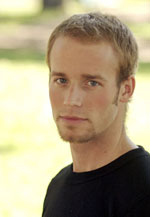David Landis
dplandis@mosaicmennonites.org
 Our leadership cultivation and communication team meets on Tuesday mornings at Bucks County Coffee in Philadelphia’s Manayunk neighborhood. I often wake up early to make the bike trek south from Harleysville, finishing the route along the Schuylkill River.
Our leadership cultivation and communication team meets on Tuesday mornings at Bucks County Coffee in Philadelphia’s Manayunk neighborhood. I often wake up early to make the bike trek south from Harleysville, finishing the route along the Schuylkill River.
This journey frequently presents challenges and discomforts—cold rain, irritable and inattentive drivers with perceived time constraints and occasional flat tires. Each ride presents opportunities to learn from unpredictable twists and turns. Preparing myself for this weekly jaunt from the suburbs has become a disciplined ritual. Arriving at the coffee shop a few minutes early often creates a welcome space to recharge for the day.
On one of these mornings in Manayunk, we invited a few others to talk about peace and justice initiatives in the Philadelphia region. With a slightly larger group, we chose to meet at the outdoor tables along the street because there wasn’t enough room inside. During the meeting, a lively older homeless man rolled up in his wheelchair and requested money to buy tokens for the public transit system.
We offered to buy him coffee and a bagel instead, which he accepted after an initial rebuttal. He began to eat and said, “Life is good. I got all this stuff.†A minute later he added, “No, I’m not eating that. I don’t need no sugar. I ain’t eating that…†We continued the meeting as he sat next to us, the situation progressing with a delicate balance of awkwardness and compassion.
The interruption was interesting on various levels. Because we had decided to meet in a place other than a Mennonite office in the suburbs, we had an opportunity to meet a person with physical needs living among us, providing a new relationship and the accompanying sense of discomfort. It was an opportunity to extend hospitality, comfort, and care for someone who might not be able to make it on their own. It was the chance to actively create community.
The discomfort, risk, and awkwardness inherent in encounters like this are ultimately what bring forth new life. And it often seems it’s most difficult to engage these growing pains with the people who are closest to our hearts—our extended church family: children, grandparents, students, and campers. By risking our comfort to care in these familiar relationships, we will be able to extend trust to those who are currently outside of our church culture—whether on the streets of Manayunk, from a different denominational background, or those who may be suffering from the war in Lebanon or experiencing religious persecution in Indonesia.
This issue explores how seeking to live out Anabaptist values can proactively foster agents of change for the reconciliation of relationships within our communities—locally and globally. It is easy for Christians to agree that there is opportunity for compassion. The challenge that will take us beyond what’s comfortable will be acknowledging our obligation to actively care by working for transformation in our community.
Julie Prey-Harbaugh’s article offers a new way of understanding and participating in Jesus’ saving work. She dreams about how the body of Christ leap will leap into action to meet the pain of broken relationships. As Brad Glick walks through the personal journey that inspired his preparation to work for structural change within social systems that inhibit the potential of our future, he quotes Beverly Harrison saying that children embody the vision and dreams of their culture. This culture is the Anabaptist community we create. Julie presents a good question then for our discernment: “What are your deepest desires and hopes for their lives?â€
May God give us strength to move beyond our fear into the awkward future that awaits us for the sake of both this generation and the next.
David Landis is an Associate for Communication and Leadership Cultivation for Franconia Conference.
The opinions expressed in articles posted on Mosaic’s website are those of the author and may not reflect the official policy of Mosaic Conference. Mosaic is a large conference, crossing ethnicities, geographies, generations, theologies, and politics. Each person can only speak for themselves; no one can represent “the conference.” May God give us the grace to hear what the Spirit is speaking to us through people with whom we disagree and the humility and courage to love one another even when those disagreements can’t be bridged.
